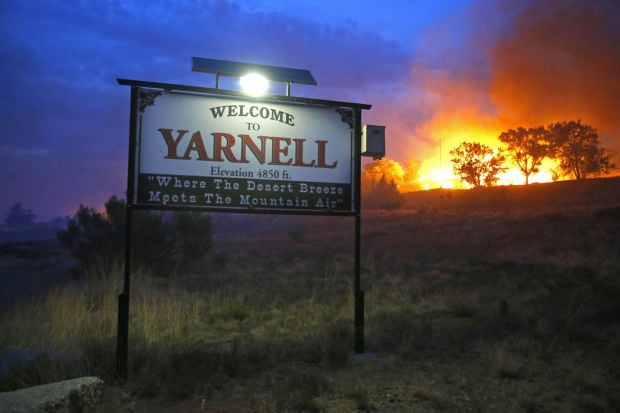PHOENIX — Attorneys for the state of Arizona are asking a federal judge to throw out the wrongful-death complaint filed by survivors of hotshots killed in last year’s Yarnell Hill Fire, claiming command decisions at the time were not “shocking” and the litigation is blocked by law.
A motion filed Friday by the Arizona Attorney General’s Office says the Division of Forestry and its fire commanders are immune, and state laws prohibit civil complaints for damages under the circumstances.
The lawsuit initially was filed in Maricopa County Superior Court by survivors of 12 of the 19 Granite Mountain Hotshots who died in June 2013 when they were trapped and overcome by flames. The complaint, which was moved to the U.S. District Court in Phoenix a week ago, alleges that fire supervisors were so negligent they violated the hotshots’ rights.
The Yarnell Hill Fire, caused by a lightning strike about 80 miles northwest of Phoenix, burned 8,400 acres and destroyed 127 homes in Yarnell, Glen Ilah and Peeples Valley as panic-stricken residents fled a wall of flame.
An investigation commissioned by the Division of Forestry essentially exonerated incident commanders, blaming the tragedy on a radical wind shift, miscommunications and fire behavior that defied expectations.
But the Arizona Industrial Commission in December issued three major workplace-safety citations with $559,000 in penalties to the Forestry Division. Investigators for the Division of Occupational Safety and Health said there were “willful serious violations” of safety protocols in planning, staffing, communications and decision-making. The fines and findings are under appeal.
Residents of Yarnell are suing the state for negligence in a separate complaint filed in Yavapai County Superior Court.
The amended federal lawsuit by hotshot families alleges that co-defendants Russ Shumate and Roy Hall, the incident commanders, were so “recklessly indifferent” toward fire-suppression safety rules that they “actually caused the deaths.”
In Friday’s motion, Assistant Attorney General Brock Heathcotte listed a half-dozen legal arguments for dismissal, including these:
- Granite Mountain Hotshots were fighting the fire as de facto state employees covered under Arizona’s workers’ compensation law, which precludes litigation. An exception for “willful misconduct” does not apply, Heathcotte wrote, unless the commanders acted with the purpose of injuring employees. There is no allegation or evidence that supervisors intended to hurt firefighters.
- Because the 19 were battling a blaze, a “firefighter’s rule” in state law prohibits negligence damages.
- An allegation that the firefighters’ constitutional rights were violated by command negligence does not meet a Supreme Court standard that says a violation occurs only if defendants’ behavior is so negligent that it “shocks the conscience.” The Division of Forestry motion says there is no evidence that incident commanders even gave orders to the Granite Mountain crew, or that other fire bosses would have acted differently under the circumstances.
Minutes before the accident, Granite Mountain members were in a safe area that already had been blackened by fire, but for reasons unknown they descended toward Yarnell via a brush-filled valley in the path of flames.
If the case survives legal hurdles and goes to trial, it likely will evolve into a dispute about whether blame for the tragedy rests primarily on fire commanders, or mistakes made by the hotshots.
Although the lawsuit seeks compensation, Patrick McGroder, an attorney for surviving families, said monetary damages were not the motive or objective. “The underpinning of this litigation is really the families want transparency and responsibility and, most importantly, a forum to ensure changes ... so this doesn’t happen again,” he added.





